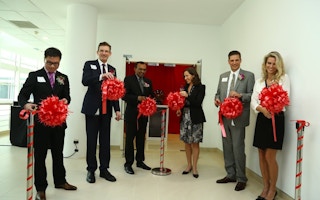Poised to tap into Singapore’s ambition to become the world’s first ‘Smart Nation’, software company Greenwave Systems on Tuesday, 27 January, launched a new research and development (R&D) centre on the Internet of Things to develop solutions for the rapidly-growing sector.
The Internet of Things, or IoT, refers to a network of interconnected gadgets and systems which talk to each other through the Internet. Latest figures from research firm International Data Corporation (IDC) has forecasted the global IoT market to grow from $1.3 trillion in 2013 to $3.04 trillion in 2020.
Government mandates are also expected to drive the Western Europe and Asia Pacific regions to outpace North America in terms of IoT revenues and installed bases by 2020, it said.
In Singapore, for example, the government aims to establish the city-state as a leading global Smart Nation that deploys a wide range of technologies, IoT infrastructure and sensors to improve the daily lives of citizens.
Greenwave Systems, which has over 230 employees worldwide and offices in the United States, Denmark, Singapore and Korea, said the new facility will deliver state-of-the-art IoT software technologies to service providers, utility and consumer electronics partners globally.
The company, founded in 2009 by technology veterans formerly from the likes of Apple and Cisco, expects to grow its Singapore team from 80 to 120 employees over the next few years.
At the heart of the company’s offering is its Axon™ managed services platform, which enables smart appliances like web-connected refrigerators, smartwatches, and home sensors to talk to each other and enable their owners to control them from anywhere in the world – as long as they have an internet connection.
Greenwave Systems founder and chief executive Martin Manniche said the possibilities of IoT applications are limitless. Some areas where IoT could have a big impact include wearable devices, energy demand management, lighting control, home safety and even eldercare, which is a huge concern for many rapidly-ageing cities worldwide.
“
We’ve had the opportunity to see first-hand how the nation’s focus on innovation and technology has attracted superb talent and exciting business prospects.
Martin Manniche, CEO, Greenwave Systems
Beyond that, Manniche sees Greenwave as playing a part in the growing global push for sustainability. Greenwave’s solutions enable homes to control their heating and cooling more intelligently, for example, allowing households to save 15 to 20 per cent on energy bills, he told Singapore Business News.
In Germany, where there is a big residential solar market, Greenwave’s technology is enabling utilities to better understand energy load patterns and when it is best to use solar energy, he added. It also alerts home owners to the amount of energy that is generated by their solar panels and when it is time to give them a clean, so as to improve the efficiency of the panels.
“Since Greenwave was established in Singapore (in 2009), we’ve had the opportunity to see first-hand how the nation’s focus on innovation and technology has attracted superb talent and exciting business prospects. This was key in our decision to establish an R&D Centre in Singapore as we look to expand our presence not only across Asia Pacific but also the global market,” said Manniche.
Thien Kwee Eng, Assistant Managing Director at the Singapore Economic Development Board, said the agency welcomed the new R&D centre, located at Singapore’s Science Park II.
“With the rise of digitisation and opportunities in consumer businesses, as well as media and energy management, we encourage Greenwave to continue to leverage Singapore’s talent pool, research institutions and sophisticated demand for the co-creation of advanced IoT technologies for the Asian market and beyond,” she said.

















